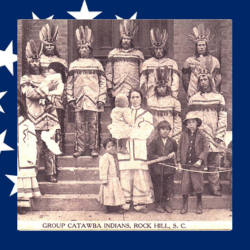
The American Revolution occurred between the mid-1760s and 1791, meaning that for years people living within the colonies had trouble understanding what direction their government was headed and were often left confused and disoriented by the constant threat of combat. This feeling was not unique to the settlers living within cities, however, and was similarly felt by indigenous people (Native Americans) for years before and during the Revolutionary War.
This constant change that indigenous tribes were forced to endure is reflected in the lack of information or records about their lives throughout that period. For example, Sally New River of the Catawba tribe was clearly an influential woman, yet little is known about her or her personal life specifically. Some of this is intentional, as what we do know indicates that she purposefully kept secrets from the British and Americans as an act of cultural maintenance and to promote the endurance of her tribe’s culture.
What is known about her, however, is that she was born around 1745, and lived near Lancaster County in eastern Pennsylvania; she was a rock for her community and actively attempted to maintain tradition during times of change. Her husband was General New River, whose true name was chosen to have been kept private.
Though Sally’s life was kept largely from the historical record, learning about her and the efforts she underwent to maintain tradition can help people understand a small portion of the larger struggle present for indigenous people throughout the Revolutionary War. They, like the new country being formed, were forced to undergo a constant change that sometimes only came accompanied by harm.
To Sally’s protest, her tribe, the Catawba, was forced onto a land reservation (an area meant for indigenous people to live), taking away the vast open spaces of her original home and forcing the tribe to live on a small patch of land.
The American Revolution positively impacted the lives of so many people, but it also sent many into disarray. Indigenous people like Sally deserve recognition for their commitment to maintaining their own culture in the face of another, larger, developing one. Even if it was to little avail, she fought for her tribe’s land to be maintained and advocated for her people’s rights to be secured. Sally existed in between multiple major cultures (indigenous people, revolutionaries, and the British), yet refused to give up the rights that she knew she had. Even though her role was untraditional, she truly was a woman of the American Revolution.
